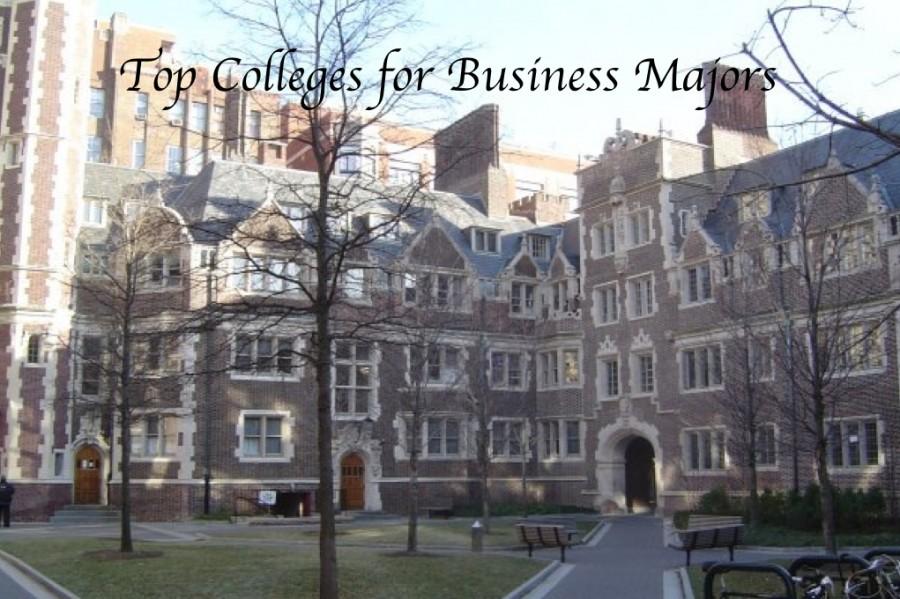College Major Series: Michigan offers business majors an excellent degree
IMAGE / Ruth Erickson / Wikimedia Commons
The University of Pennsylvania is a top college for business degrees.
The staff of The Eclipse is writing a series about the most popular majors in the United States and the colleges that offer the best programs for them. This is Part Four of a 5-part series.
From being a store clerk to a bank manager, business majors have a vast field of job opportunities.
The most popular majors in business are accounting, economics, finance, business management, and marketing.
Mr. Austin Brewer, Kearsley alumnus, is currently attending the University of Michigan and is working toward a major in economics. He advises anyone who wants to go into business to study it at the college level.
“I would advise them to go to a business school,” Brewer said. “If you can, make sure to sample classes from different business disciplines and find something (you) enjoy.”
Accounting
Accounting, at its core, is the process of keeping financial accounts.
The 10 best colleges to study accounting – with their cost of attendance – are:
1. University of Texas-Austin – about $32,000
2. University of Illinois-Urbana-champagne – $44,194
3. Brigham Young University-Provo – $17,726
4. University of Notre Dame – $62,461
5. University of Pennsylvania – $64,200
6. University of Southern California – $55,535
7. University of Michigan- Ann Arbor – $26,984-$55,404
8. Indiana University-Bloomington – $47,270
9. New York University – $66,542
10. Ohio State University-Columbus – $41,766
Accounting is important for any organization to maintain correct financial records.
Accounting is a fast growing major that is predicted to stay that way due to the growth of corporations in the economy.
Economics
Economics is the study of the distribution, production, and consumption of goods and services within the economy.
The 10 best colleges to study economics – with their cost of attendance – are:
1. Harvard University – $62,250 – $68,050
2. Massachusetts Institute of Technology – $61,030
3. Princeton University – about $55,832
4. University of Chicago – $64,258
5. Stanford University – $62,801
6. University of California- Berkeley – $35,470
7. Northwestern University – $45,120
8. Yale University – $63,250
9. University of Pennsylvania – $64,200
10. Columbia University – $63,440
In a more broad sense, economics is the study of how people and organizations choose to spend their time and money.
According to Brewer, a degree in economics is best used to analyze the market, not to participate in it.
“A student might consider an economics degree if they want to go into investing or do business consulting,” Brewer said. “It won’t teach you how a business is run, it will teach you the ideal practices of a firm.”
Finance
Majoring in finance means studying investment and commercial banking, how to budget and forecast, and how to manage assets and liabilities.
The 10 best colleges to study finance – with their cost of attendance – are:
1. University of Pennsylvania – $64,200
2. New York University – $66,542
3. University of Michigan- Ann Arbor– $26,984-$55,404
4. Massachusetts Institute of Technology – $61,030
5. University of California- Berkeley – $35,470
6. University of Texas-Austin – about $32,000
7. University of Virginia – about $40,000
8. University of North Carolina- Chapel Hill – $50,938
9. Carnegie Mellon University – $63,822
10. Indiana University- Bloomington – $47,270
Business Management
Business management involves the activities associated with running a company, such as controlling, leading, and planning.
The 10 best colleges to study business management – with their cost of attendance – are:
1. University of Michigan- Ann Arbor – $26,984-$55,404
2. University of Pennsylvania – $64,200
3. University of Virginia – about $40,000
4. University of California- Berkeley – $35,470
5. University of North Carolina- Chapel Hill – $50,938
6. University of Texas- Austin – about $32,000
7. New York University – $66,542
8. Massachusetts institute of Technology – $61,030
9. Indiana university- Bloomington – $47,270
10. University of Notre Dame – $62,461
Managerial positions are debatably the most work-intensive jobs in business. Managers are responsible for all of those working below them.
Brewer said that a major in management, finance, or accounting is “a better choice” for students who are serious about working in a business environment.
“They will prepare you better for a business career,” Brewer said.
Marketing
Marketing involves examining consumer needs, translating those needs into a good or service, and then mass producing these goods and services for distribution.
The 10 best colleges to study marketing – with their cost of attendance – are:
1. University of Michigan-Ann Arbor – $26,984-$55,404
2. University of Pennsylvania – $64,200
3. University of Texas- Austin – about $32,000
4. Indiana University-Bloomington – $47,270
5. University of California-Berkeley – $35,470
6. University of North Carolina-Chapel Hill – $50,938
7. New York University – $66,542
8. University of Virginia – about $40,000
9. University of Wisconsin-Madison – $41,366
10. University of Southern California – $55,535
Overall, marketing is how to get people to buy a good or service.
The top college for business majors is the University of Pennsylvania, a school founded by Benjamin Franklin
With a cost of attendance of $64, 200 a year, the Pennsylvania comes with a large price tag.
Although Brewer is attending a top university for his degree, he advises that students worry less about the pedigree of the school and more about the pure education.
“I wouldn’t sweat your undergraduate school too much,” Brewer said. “Find a cost-effective school that won’t put you in extreme amounts of debt when you graduate but will help you get a job when you graduate.”
Brewer does say that pedigree matters more in a graduate degree.
“It is only for a graduate degree where you might want to consider the name of the school. I would recommend working around what you can afford and not breaking the bank just to go to a big-name school.”

Senior
Birthday: October 28, 1998
Extracurricular activities: Marching Band
Hobbies: Playing brass instruments, Fantasy sports
Plans after...














